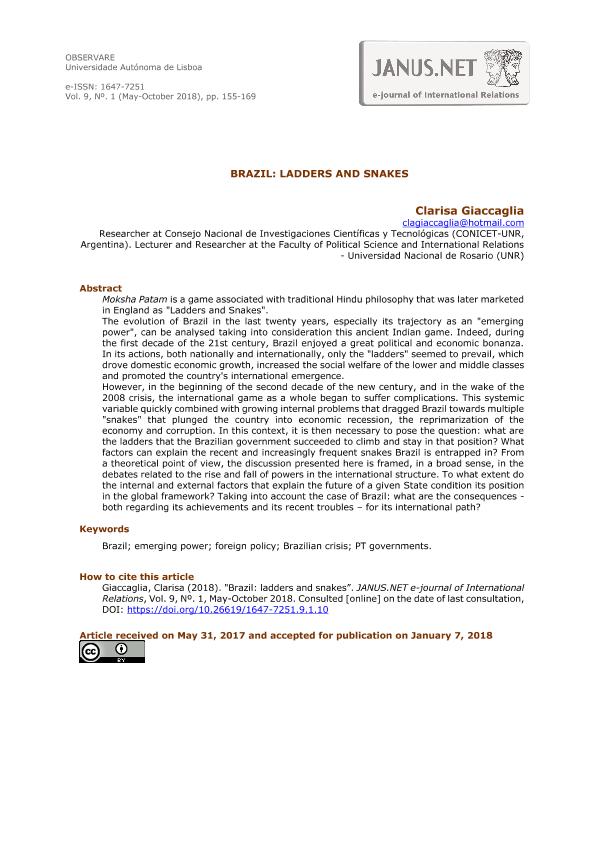Mostrar el registro sencillo del ítem
dc.contributor.author
Giaccaglia, Clarisa

dc.date.available
2019-12-30T17:04:47Z
dc.date.issued
2018-05
dc.identifier.citation
Giaccaglia, Clarisa; Brazil: Ladders and snakes ; Observare; Janus.net; 9; 1; 5-2018; 155-169
dc.identifier.uri
http://hdl.handle.net/11336/93271
dc.description.abstract
Moksha Patam is a game associated with traditional Hindu philosophy that was later marketed in England as "Ladders and Snakes". The evolution of Brazil in the last twenty years, especially its trajectory as an "emerging power", can be analysed taking into consideration this ancient Indian game. Indeed, during the first decade of the 21st century, Brazil enjoyed a great political and economic bonanza. In its actions, both nationally and internationally, only the "ladders" seemed to prevail, which drove domestic economic growth, increased the social welfare of the lower and middle classes and promoted the country's international emergence. However, in the beginning of the second decade of the new century, and in the wake of the 2008 crisis, the international game as a whole began to suffer complications. This systemic variable quickly combined with growing internal problems that dragged Brazil towards multiple "snakes" that plunged the country into economic recession, the reprimarization of the economy and corruption. In this context, it is then necessary to pose the question: what are the ladders that the Brazilian government succeeded to climb and stay in that position? What factors can explain the recent and increasingly frequent snakes Brazil is entrapped in? From a theoretical point of view, the discussion presented here is framed, in a broad sense, in the debates related to the rise and fall of powers in the international structure. To what extent do the internal and external factors that explain the future of a given State condition its position in the global framework? Taking into account the case of Brazil: what are the consequences -both regarding its achievements and its recent troubles – for its international path?.
dc.format
application/pdf
dc.language.iso
eng
dc.publisher
Observare
dc.rights
info:eu-repo/semantics/openAccess
dc.rights.uri
https://creativecommons.org/licenses/by/2.5/ar/
dc.subject
BRAZIL
dc.subject
BRAZILIAN CRISIS
dc.subject
EMERGING POWER
dc.subject
FOREIGN POLICY
dc.subject
PT GOVERNMENTS
dc.subject.classification
Otras Ciencia Política

dc.subject.classification
Ciencia Política

dc.subject.classification
CIENCIAS SOCIALES

dc.title
Brazil: Ladders and snakes
dc.title
Brasil: Escaleras y serpientes
dc.type
info:eu-repo/semantics/article
dc.type
info:ar-repo/semantics/artículo
dc.type
info:eu-repo/semantics/publishedVersion
dc.date.updated
2019-12-10T16:49:51Z
dc.identifier.eissn
1647-7251
dc.journal.volume
9
dc.journal.number
1
dc.journal.pagination
155-169
dc.journal.pais
Portugal

dc.journal.ciudad
Lisboa
dc.description.fil
Fil: Giaccaglia, Clarisa. Consejo Nacional de Investigaciones Científicas y Técnicas. Centro Científico Tecnológico Conicet - Rosario; Argentina. Universidad Nacional de Rosario; Argentina
dc.journal.title
Janus.net
dc.relation.alternativeid
info:eu-repo/semantics/altIdentifier/doi/http://dx.doi.org/10.26619/1647-7251.9.1.10
dc.relation.alternativeid
info:eu-repo/semantics/altIdentifier/url/https://observare.ual.pt/janus.net/en/previous-issues/131-english-en/vol-9,-n-1-may-october-2018/425-en-vol9-n1-art10
Archivos asociados
